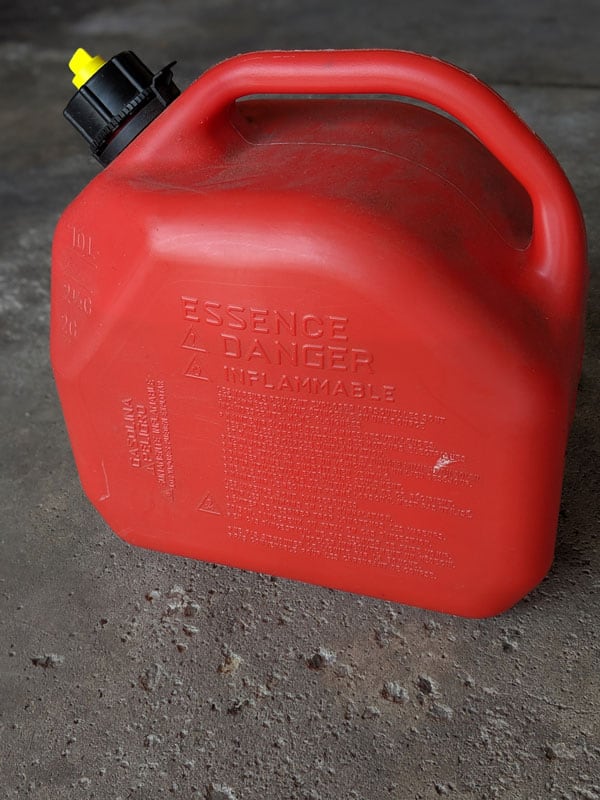Table of Contents
At What Temperature Can Gasoline Freeze?
We just recently had one of the coldest weather patterns come through the midwest in recent memory. It had me wondering should I be concerned about the gasoline I have in storage freezing? I was wondering at what temperature will gasoline begin to freeze? Will gasoline freeze up in gas pumps if it gets too cold?
Gasoline instead has a freezing range in which gasoline can start to become frozen. The freezing range of gasoline is anywhere from -50 to -100 degrees Fahrenheit. This is the point where your fuel will start to solidify or start to gel up.
Gasoline because it is a mixture of different additives does not have a definitive freezing point. Gasoline mixtures will vary depending on what area of the world you live in and what time of year it currently is. In the northern United States, gasoline is formulated differently to be able to withstand the cold temperatures of the cold winter months.
Since such low temperatures are required to be able to freeze gasoline it’s unlikely that you will ever have to worry about your gasoline becoming frozen. But what is the best way to store gasoline over the winter months and how do you prevent gas from freezing?
How Can You Prevent Gasoline From Freezing?
If you are expecting your area to have temperatures below -50 degrees F for an extended period of time you would want to try to protect your vehicle from those subzero temps. Obviously, if you own a garage this is an easy solution.
If you own some sort of pole barn or other vehicle storage area it would be a good idea to store your car or other gasoline-powered vehicles or tools in an area that is going to remain above -50 degrees F.
Having your vehicle in subzero temps for an extended period of time can also cause harm to your fuel system. If your fuel system has any water vapor inside of it this can cause the inside of the tank to start to freeze at the freezing point of water.
This can cause issues if frozen water gets tried to get sucked through your fuel pump and into your engine. This can cause your fuel pump to go out if it tries to suck a large chunk of ice through the fuel filter.
If you do not own a garage you may want to try to provide shelter to your vehicle by placing a car cover over the vehicle when you are not driving it. This would at least keep any snow or ice from directly sitting on the vehicle and will protect the vehicle from cold wind gusts.
How Should Gasoline Be Stored During the Winter?
For most people they do not live in areas that are cold enough to get below -50 degrees F. If you do not live in an area that gets that cold then you would be fine with storing your gasoline in a standard gasoline storage container in a garage.
If you are interested in checking out the current prices on Amazon of a gasoline storage container that I would recommend click here.
Not storing your gas in a sealable container can cause it to oxidize and eventually go bad over time especially if you are going to be letting it sit for months. If you are not sure if you have bad gas or what color gas should be then be sure to check out my other article.
If you do live in an area that gets that cold for an extended period of time then you would want to find a way to store your gasoline in an area that won’t get that cold. If you have an attached garage on your home typically they will be insulated enough so that the temperatures should not get that low inside of it.
In my attached garage temperatures are consistently at least 20-30 degrees above what they are outside. We recently had a cold snap of temperatures here in Indiana where the temperatures dipped all the way down to -20 degrees F with the wind chill.
While it was cold in my garage it never got cold enough to get where I was worried about the gasoline in my gasoline storage tank freezing. If your garage is not attached to your home then you may want to look at some sort of heating solution for your garage.
An electric space heater is safe and will heat the main portion of your garage. Depending on how large a space heater you go with they are designed to heat different square footage areas. Make sure that you know how many square feet the heater is supposed to heat before you buy it.
That way you can measure the square footage of the area that you are trying to heat and make sure that the space heater is going to be adequate for that area. You don’t want to buy an underpowered space heater.
Does Octane Affect the Freezing Point of Gasoline?
You may also be wondering if the different octane ratings of gasoline will affect the freezing point of gasoline. Octane is a hydrocarbon that is present in different ratings that you can see at the fuel pump. The higher the rating of gasoline the more octane is present in the gasoline.
While the different octane ratings will affect the performance of the engine the octane rating of fuel will not sway the freezing point of gasoline by any large margin. Like I mentioned above gasoline will freeze at different temperatures depending on what the chemical makeup is of that batch of gasoline.
The octane rating of that gasoline batch would be a very small factor in the overall temperature that your gasoline could freeze at.
Can Diesel Gas Freeze?
If you were wondering if gasoline has a freezing point you may also be wondering if diesel can also freeze? The answer is yes like gasoline diesel can also begin to freeze if you get it cold enough. In doing the research for this article many people mentioned that diesel engines did not do as well in the cold as gasoline engines.
With that in mind if you know that your area will experience cold temperatures during the winter months you may want to look at going with a gasoline engine. One thing that diesel engines typically do have in their arsenal to help during the winter months is called a block heater.
A block heater is a heater that is installed on the underside of your engine that heats up your engine block so that it is warm before you go to fire up your engine. This can come in handy in winter months so that you can make sure that your engine is warm before you go to fire it up.
This can sometimes be a hassle in the cold winter months to go outside to plug in your engine block heater to your extension cord so also keep that in mind.
I’ve owned a gasoline-powered mustang that was sold in Canada that was equipped with a block heater. These are not as common in the United States so I was unfamiliar with seeing a vehicle equipped with one. Most diesel trucks will come with block heaters from the factory.
What is the Freezing Point of Oil?
Another liquid that you may be concerned about freezing in your vehicle would be your engine oil. The good news is that engine oil is designed to not freeze at any temperature. However just because engine oil is not frozen it does not mean that it will function as well in cold temperatures.
In sub-zero conditions, your engine’s oil will begin to thicken up like syrup and begin to lose its ability to lubricate your engine as well. That is why it is important especially in the winter months to give your engine a bit of time to warm up before you go and take it for a drive.
If your engine has not had enough time to properly warm-up and you rev your engine high while merging onto a roadway this can be hard on your engine. Your engine oil may not have had the chance to warm up back into a liquid to be able to lubricate the internal components of your engine.
Can your fuel filter freeze?
Your fuel filter is designed to catch the impurities in your fuel but will have a hard time doing that if your fuel starts turning into a slushy substance. As your fuel starts to turn from a liquid to a solid your fuel system is going to have trouble being able to function properly.
If your fuel pump is not able to pump fuel into your fuel lines to be able to be used by your engine is going to have trouble running properly. This can also cause issues for your fuel filter as it may be sucking in impurities that had settled at the bottom of your fuel tank. If your fuel filter sucks these in you may be looking at replacing your fuel filter soon.
What is the freezing point of petrol?
Our friends across the pond call their gasoline petrol. Petrol is essentially a synonym for gasoline so it will also freeze if temps get cold enough. Petrol like gasoline does not have a freezing point because petrol is designed differently based on what area the petrol was made.
Can Gasoline Freeze? – In Conclusion
Now you should know that while gasoline can freeze it will only freeze at extremely low temperatures of -50 degrees Fahrenheit. This means for most of the world that they should not be too concerned with their gasoline accidentally freezing in their vehicle.
However, if you own a diesel vehicle you may want to take steps to prevent your vehicle from being in subzero temperatures for too long. Diesel has a lower freezing threshold than gasoline and will start to gel up in cold weather conditions.


